Books
Books
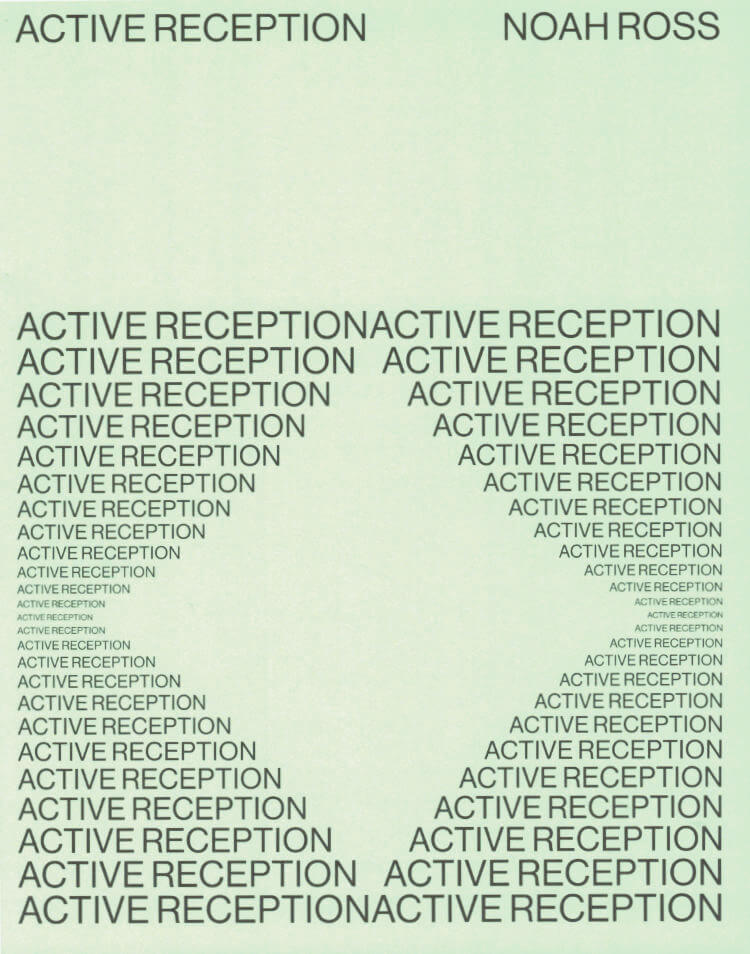
Active Reception
A vibrant work of lyric, conceptual, and confessional poetic modes pitched to enact a queer politics of liberation.
Active Reception is a book of bottoming lovers, the world around us, and a history of letters, that thinks through a queer mode of writing from the bottom, a kind of coalition based politics of receptivity and expansion that is open to the world around us, its myriad life forms, its systemic oppressions, its hidden ghosts.
Noah Ross is a bookseller, editor, and poet based in Berkeley, CA. Noah is the author of Swell, and an editor of Baest: a journal of queer forms & affects, and Mo0on/IO with Lindsay Choi.

Deep Scroll
From theory-inspired poetry to technocratic desires concealed behind razorblades; from anarchy to mass-entertainment; from the collapse of binary distinctions of scale to post-human architecture; from the vibratory power of sound and vision to crowds, to the rejection of natural essentialism, materialist universality, and the haunted houses of the Anthropocene, all can be found in Deep Scroll. Edited by the artist Anne de Vries in collaboration with an AI text generator, this book offers an offline domain in which a network of artistic gestures and theoretical contributions are collected for your scrolling needs.
Comprising a range of scrolling pathways that serve as hyperlinks and references to past art projects, sketches, research, and documentation, this book overflows with texts and collages that generate ambiguous algorithms that fleetingly capture the focus of our configurations. All content smoothly flows, driving an accelerated state of correlation to the point of its collapse. Deep Scroll is designed to be reactive; it may induce an epiphany, or to leave the reader at the nadir of a cognitive abyss.
DEEP SCROLL is an artist publication produced in collaboration with AISSystem and Onomatopee. This limited edition contains contributions by Ariella Azoulay, Alain Badiou, Iain Hamilton Grant, Amelia Groom, Nicholas Korody, AI text generators, and many others.
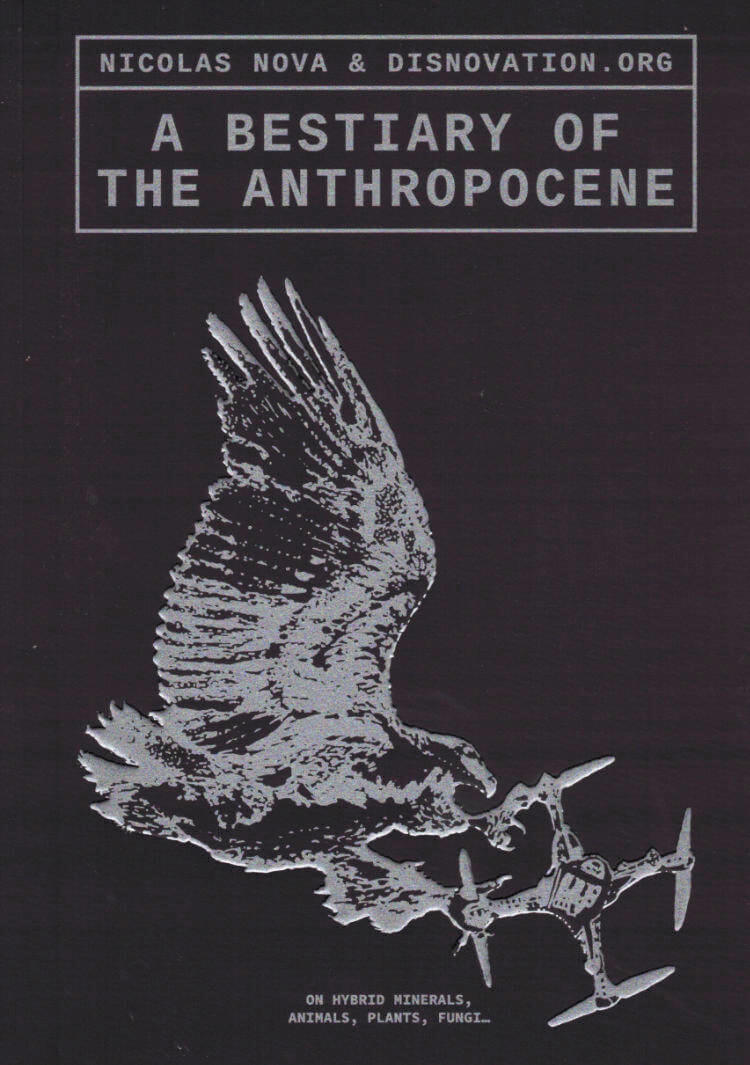
A Bestiary of the Anthropocene
Nicolas Nova, Nicolas Maigret and 1 more
Equally inspired by medieval bestiaries and observations of our damaged planet, A Bestiary of the Anthropocene is a compilation of hybrid creatures of our time. Designed as a field handbook, it aims at helping us observe, navigate, and orientate into the increasingly artificial fabric of the world.
Plastiglomerates, surveillance robot dogs, fordite, artificial grass, antenna trees, Sars-Covid-2, decapitated mountains, drone-fighting eagles, standardised bananas… each of these specimens are symptomatic of the rapidly transforming “post-natural” era we live in. Often without us even noticing them, these creatures exponentially spread and co-exist with us.
A Bestiary of the Anthropocene seeks to capture this precise moment when the biosphere and technosphere merge and mesh into one new hybrid body. What happens when technologies and their unintended consequences become so ubiquitous that it is difficult to define what is “natural” or not? What does it mean to live in a hybrid environment made of organic and synthetic matter? What new specimens are currently populating our planet at the beginning of the 21st century?

Research For People Who (Think They) Would Rather Create
What is artistic research? What is a research document? How do these relate to the making process, invention, and creativity? What exactly is expected of me? If you have ever asked yourself any of these questions, then this book is for you. Research For People Who (Think They) Would Rather Create addresses all relevant aspects that need to be considered during a research and documentation process, such as: finding the right topic and approach; formulating your research question; working out your methods; choosing one or more suitable writing styles; and considering the possible roles of visual, virtual, auditory, embodied, and spatial materials.
Research For People Who (Think They) Would Rather Create shows a multitude of examples from the field of art and design – each of which illustrates one specific aspect of developing a thesis, essay, paper, research document, or however else it may be referred to in your own setting. You can read this book from cover to cover, or you can immediately flip to those subjects which you find most relevant at any given moment. Ultimately, Research For People Who (Think They) Would Rather Create is an invitation to contribute – quite literally, with your own projects, examples, and questions – since the ultimate goal is to help you develop your own research.

Ich Bin Sandra: Nine Poems
With contributions by Bogdan Ablozhnyy, John Flindt, Graham Hamilton, Karl Holmqvist, Lin Jing, David Moser, Dudu Quintanilha, Ian Waelder and Vera Varlamova.
Published on the occasion of the workshop #THEREISNOAUDIENCE... held by Karl Holmqvist on Friday November 15th, 2019 at Städelschule, Frankfurt am Main.
Participants in the workshop #THEREISNOAUDIENCE... started with some basic voice exercises chanting out all vowels together as a group (including the Sweedish Å Ä Ö). They were then asked to write down two random sentences each that were compiled to a list and then read out loud before finally being used in the nine poems by each individual participant. In the meantime there were some discussing around what it takes exactly to be performing in front of others, differences between the spoken and the writen and the role of language and writing in visual arts.

When Carrying Becoming Caring
“In this recent publication (to be printed January 2021) created as a part of my residency at Artist-in-Residence 2020 Petrohradska kolektiv in Prague, I wanted to share a few thoughts on how ‘matter matters’ within artistic practices, but at the same time, it was my attempt to experiment with the ways of presenting research and let the reader trace it as it was evolving – through various forms of notes, readings, writings, and conversations.”
Karolina Rybačiauskaitė (b. 1992) is a researcher currently living between Vilnius and Prague. She studies Ph.D. in Philosophy at Vilnius University, also graduated in History and Theory of Art at Vilnius Academy of Arts. Her research is motivated by the instability of knowledge-making and by searching for the ways to take care of the complex patterns it creates. This involves studying the speculative account of ‘ecology of practices’ proposed by Isabelle Stengers, but also adding to it through various practical engagements with artistic and curatorial reworkings of their matters.
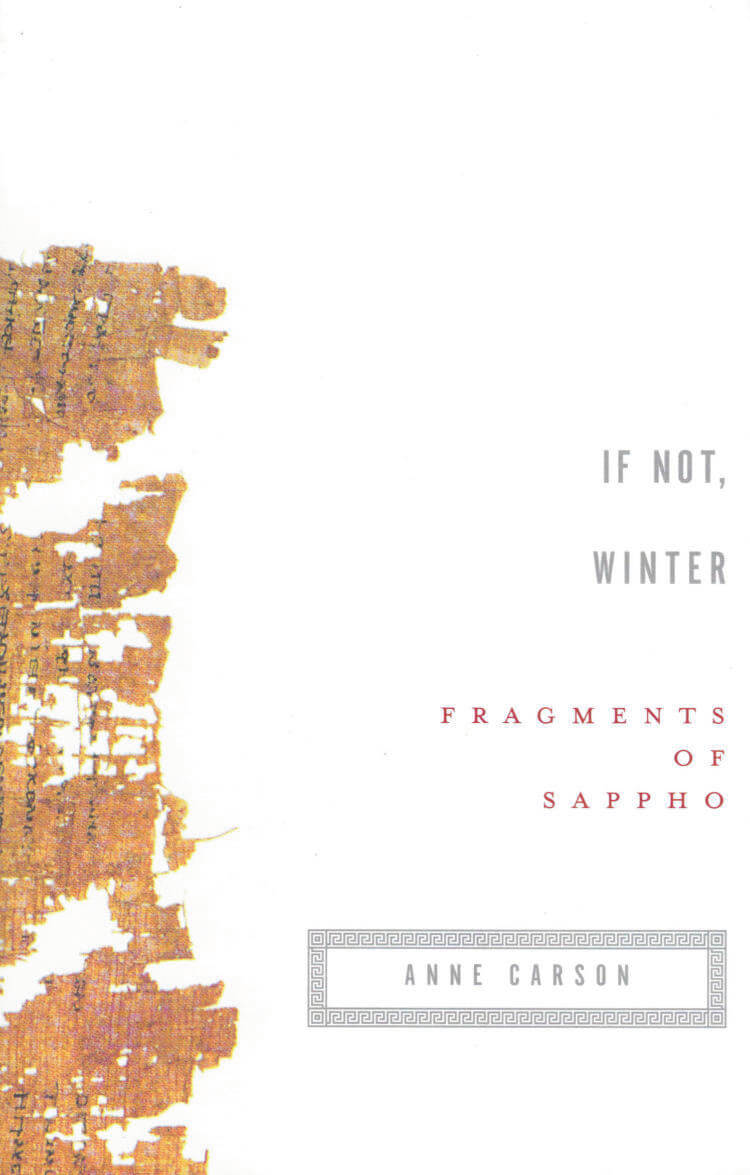
If Not, Winter
Of the nine books of lyrics the ancient Greek poet Sappho is said to have composed, only one poem has survived complete. The rest are fragments. In this miraculous new translation, acclaimed poet and classicist Anne Carson presents all of Sappho's fragments, in Greek and in English, as if on the ragged scraps of papyrus that preserve them, inviting a thrill of discovery and conjecture that can be described only as electric, or, to use Sappho's words, as "thin fire . . . racing under skin."
By combining the ancient mysteries of Sappho with the contemporary wizardry of one of our most fearless and original poets, If Not, Winter provides a tantalizing window onto the genius of a woman whose lyric power spans millennia.

Truant: Photographs 1970-1979
Throughout the 1970s, filmmaker Barbara Hammer toured the United States, Africa, and Europe, making film after film about women and the lesbian experience, both of which had seldom been seen by a woman, for women on screen before. She made a slew of now-legendary experimental films, including Sisters! (1973), Dyketactics (1974), Multiple Orgasm (1976), Sappho {1978), and Double Strength {1978), more or less inventing lesbian cinema at a time when such material had largely been relegated to the pornographic imagination of male artists and filmmakers. During this prolific period, Hammer photographed her travels, her lovers, moments of community and kinship between her collaborators on set, private and public performances, friends, strangers. Through these photographs, Hammer explodes traditional notions of female sexuality by showing it for what it is: complex, messy, abstract, human.
Barbara Hammer is an experimental filmmaker whose work has pioneered feminist and lesbian cinema for five decades. She has had film retrospectives at the Jeu de Palme (Paris), Museum of Modern Art (New York), Tate Modern (London), National Gallery of Art (Washington, Dq, Kunsthall (Oslo, Norway), Toronto Film Festival, and Pink Life Queer Festival (Ankara and Istanbul, Turkey). Her work was included in the 1985, 1989, and 1993 Whitney Biennials and is included in the permanent collections of the Australian Center for the Moving Image, the Museum of Modern Art (New York), the Centre Georges Pompidou, and elsewhere. She is the author of Hammer! Making Movies Out of Sex and life (Feminist Press 2009). An exhibition of her notebooks was presented at Company Gallery in Fall 2014. A follow-up exhibition at Company, Truant: Photographs, 1970 – 1979, featuring unseen photographs from the 1970s, opened in October 2017.

== #2 (edition)
First launched in 2012, and published by mfc michèle didier (micheledidier.com), == is a small-run arts publication, edited by Matt Keegan. ==#2, 2015, is designed by Su Barber and published in an edition of 500 by Capricious Publishing. Barber and Keegan worked together on North Drive Press (northdrivepress.com) between 2005-2010, and this publication shares a variety of traits with NDP.
==#2 is a non-thematic arts publication contained in a box with a 96-page bound volume featuring artist-to-artist interviews, texts, and transcriptions. Six loose multiples are also included.
Contributors include: Sam Anderson, Uri Aran, Fia Backström, Darren Bader, Judith Barry, Stefania Bortolami, Daniel Bozhkov, Milano Chow, Anna Craycroft, Lucky DeBellevue, Cristina Delgado, Haytham El-Wardany, Jake Ewert, Vincent Fecteau, Corrine Fitzpatrick, Harrell Fletcher, Rachel Foullon, Aurélien Froment, Kenny Greenberg, Calla Henkel, Leslie Hewitt, Jaya Howey, Adelita Husni-Bey, Iman Issa, Ruba Katrib, Jill Magid, Jo Nigoghossian, Aaron Peck, Max Pitegoff, David Placek, Olivia Plender, Lisa Robertson, Andrew Russeth, Amy Sillman, Diane Simpson, Greg Parma Smith, Jessica Stockholder, Martine Syms, and Anicka Yi.

Se Te Subió El Santo (Are You In A Trance?)
Se Te Subió El Santo is a collection of self – portraits taken by the artist directly after she awoke every morning while away on a week-long residency in Iowa City, IA at the Center for Afrofuturist Studies in Spring 2016. This daily practice confronts notions of the artist’s interests in rendering a full self implicit of gender, race, sexuality, and spirituality while challenging and collapsing the intersections of each identity as well.
The title of the work is taken from Ana Mendieta, the Iowa Years: A critical study, 1969 through 1977 where Julia Ann Herzberg writes in the dissertation:
Ana and Raquelin Mendieta’s vocabulary contained many Afro-Cuban idiomatic expressions. For example, they would often respond to a friend who was acting in an unruly or hyperactive manner by asking” “Se te subió el santo? (“Are you in a trance?”) In the Afro-Cuban context, the expression “subirse el santo” is used in religious ceremony when the orisha/saint takes possession of the believer.
The monograph also includes an essay by author Akwaeke Emezi.
First edition, 94 page, black and white, leather bound hardcover with white foil embossment
TIONA NEKKIA MCCLODDEN is an interdisciplinary research-based conceptual artist, filmmaker and curator whose work explores, and critiques issues at the intersections of race, gender, sexuality and social commentary. McClodden’s interdisciplinary approach traverses documentary film, experimental video, sculpture, and sound installations. Themes explored in McClodden’s films and works have been re-memory and more recently narrative biomythography.

Randy Issue #3
Randy engages inter-generational dialogue as a means to examine multiple perspectives on queer identity and gender.
In bringing together under-represented voices in a collaborative discussion, Randy expands the politics of art, sexuality, and aesthetics. Intent on fostering un-trodden affiliations, Randy publishes both emerging and established artists and writers. Through printed content, special events and curated shows, Randy produces an urgently needed genealogy of international queer artists and thinkers alike.
Randy is the personal and nepotistic project of A.K. Burns and Sophie Morner. Initiated in late 2009, Clark Solack became co-editor in the fall of 2011.
Issue #3—Reina Gossett / Tuesday Smillie / Jen Rosenblit / Niv Acosta / Julia Gillard / Martha Wilson / Ramdasha Bikceem (Klub Kid Vintage) / Stanya Kahn / Emily Hope / Sadie Benning / Sarah Forbes Keough / Meriem Bennani / Cassie Peterson / Kathe Burkhart / Isaac Preiss / Clark Solack / Hanna Wilde / Melanie Bonajo

Non-Human Persons
The first book of Melanie Bonajo’s new series, Matrix Botanica.
Non-Human Persons explores our relationship with Nature photography, animals and the Internet. It is a 140+ page, softcover, full-color, magazine-style artist book designed by Experimental Jetset.
Can we send funny animal pictures to space for aliens to discover the Earth’s ecosystem? Our enormous access to animal pictures on the Internet tramples our awareness that only humans possess self awareness, language, culture, land and customs. But when does a lion stop being a lion? How are typical Nature photography categories designed by the hands of science replaced by the images of amateurs who document the disappearing surroundings of wildlife by ever expanding urbanization? As a result, do we need complete revised scientific categories for these images?
For 10 years, Melanie Bonajo has collected thousands of animal pictures online, this book is her exploration of these questions.

Girls Against God Issue #2
In collaboration with cross-disciplinary artist Bianca Casady of music duo CocoRosie, 2013 brought the release of a new print magazine entitled Girls Against God (GAG). A boldly feminist exploration and multi-generational endeavor, GAG deploys the arts to illuminate the oppressive, obsolete nature of traditional, male-defined religions and other patriarchal institutions—“We must resist and reinvent,” Casady declares.
The second issue of GAG—a pocket book of practical magic—investigates and celebrates spiritual healing, instinctually tying together the earth and women’s bodies. Through essays, fiction, poetry, interviews and spells GAG Issue 2 delves into the roots of occult earth wisdom passed through generations of women against persecution and patriarchy. Texts are accompanied by rich black and white images ranging from pen and ink illustrations to enigmatic photography. The issue gathers around a collaborative photographic exploration between Casady and performance artist Melanie Bonajo entitled “Witchunt,” and also includes interviews with notable artists Carollee Schneemann and Suzanne Lacy
Issue #2—Melanie Bonajo / Eve Bradford / Trinie Dalton / Karolina Daria Flora / Mary Hanlon / Julie Higonnet / J.ZarA / Emely Neu / Kara L. Rooney / Jean Marc Ruellan / Minka Sicklinger / Macho Mel Shimkovitz

How To Wash A Heart
How To Wash A Heart, Kapil's first full-length collection published in the U.K., depicts the complex relations that emerge between an immigrant guest and a citizen host. Drawn from a first performance at the ICA in London in 2019, and using poetry as a mode of interrogation that is both rigorous, compassionate, surreal, comic, painful and tender, by turn, Kapil begins to ask difficult and urgent questions about the limits of inclusion, hospitality and care.
Winner of the T.S. Eliot Prize 2020.
Poetry Book Society Choice for Summer 2020.
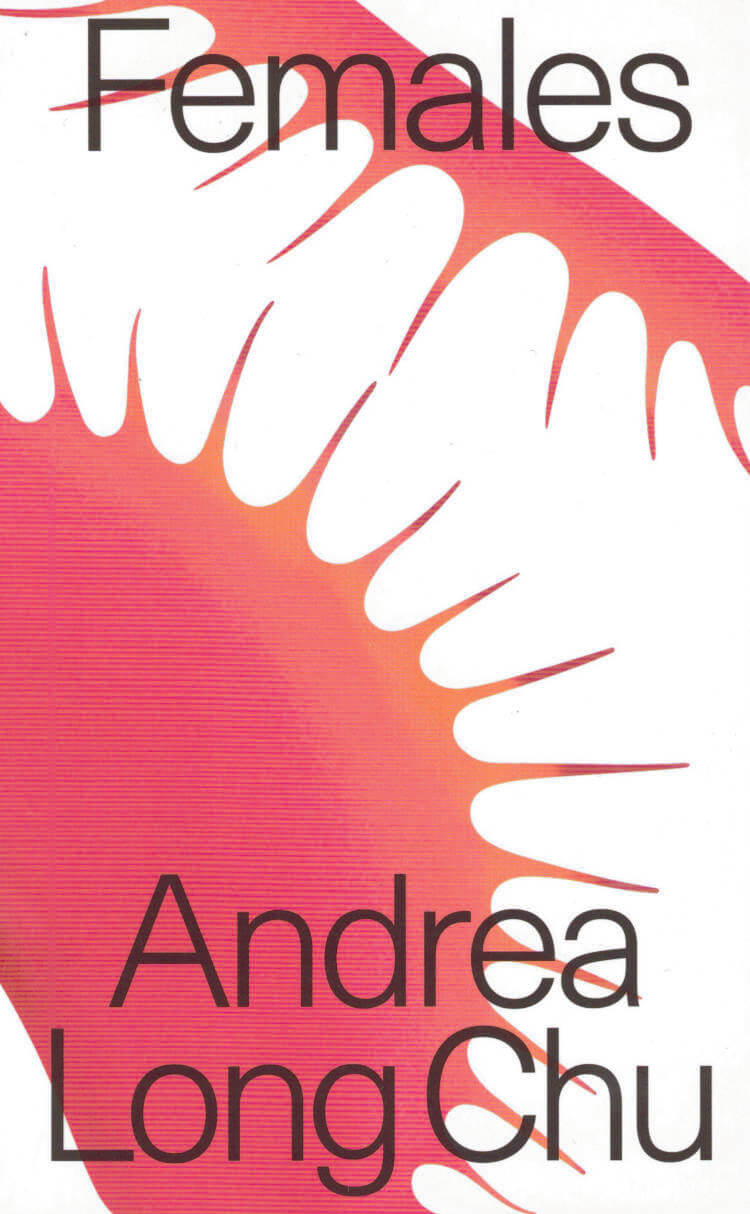
Females
Females is Andrea Long Chu's genre-defying investigation into sex and lies, desperate artists and reckless politics, the smothering embrace of gender and the punishing force of desire.
Drawing inspiration from a forgotten play by Valerie Solanas—the woman who wrote the SCUM Manifesto and shot Andy Warhol—Chu aims her searing wit and surgical intuition at targets ranging from performance art to psychoanalysis, incels to porn. She even has a few barbs reserved for feminists like herself. Each step of the way, she defends the indefensible claim that femaleness is less a biological state and more a fatal existential condition that afflicts the entire human race— men, women, and everyone else. Or maybe she's just projecting.
A thrilling new voice who has been credited with launching the "second wave" of trans studies, Chu shows readers how to write for your life, baring her innermost self with a morbid sense of humor and a mordant kind of hope.

The Sacred Conspiracy
Georges Bataille's secret society, long the stuff of legend, is now revealed in its texts, meditations, rules and prohibitions.
This book recounts what must be one of the most unusual intellectual journeys of modern times, in which the influential philosopher, cultural theorist and occasional pornographer Georges Bataille (1897-1962), having spent the early 1930s in far-left groups opposing the rise of fascism, abandoned that approach in order to transfer the struggle onto the mythological plane.
In 1937, Bataille founded two groups in order to explore the combinations of power and the sacred at work in society. The first group, the College of Sociology, gave lectures that were intended to reveal the hidden undercurrents within a society on the verge of catastrophe. The second group was Acéphale, a genuine secret society and anti-religion whose emblem was a headless figure that, in part, represented the death of God. Until the discovery a few years ago of the group's internal papers (which include theoretical texts, meditations, minutes of meetings, rules and prohibitions and even a membership list), almost nothing was known of its activities.
This book is the first to collect a representative selection of the writings of Bataille, and of those close to him, in the years leading up to World War II. The texts published here comprise lectures given to the College of Sociology by Bataille, Roger Caillois and Michel Leiris, essays from the Acéphale journal and a large cache of the internal papers from the secret society. A desperate narrative unfolds, wherein Bataille risked all in a wholly unreasonable quest—with a few fellow travelers, he undertook what he later described as a journey out of this world.
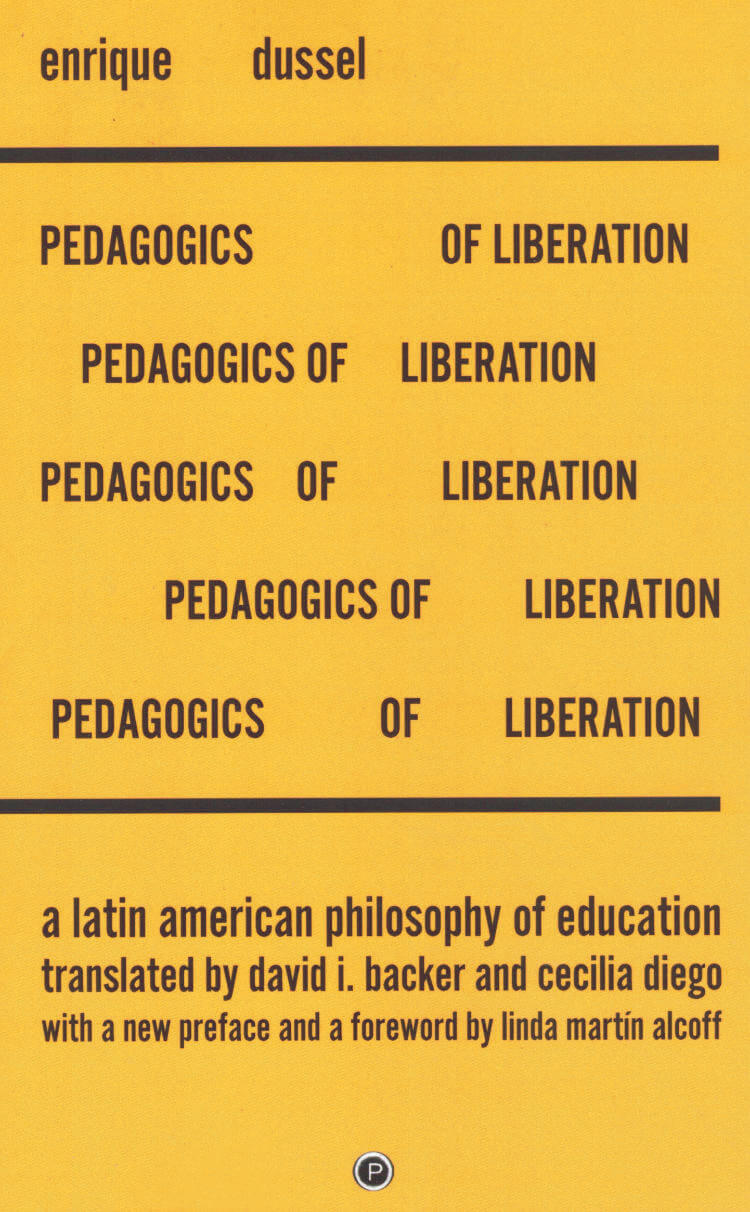
Pedagogics of Liberation: A Latin American Philosophy of Education
Enrique Dussel is considered one of the founding philosophers of liberation in the Latin American tradition, an influential arm of what is now called decoloniality. While he is astoundingly prolific, relatively few of his works can be found in English translation - and none of these focus specifically on education. Founding members of the Latin American Philosophy of Education Society David I. Backer and Cecilia Diego bring to us Dussel's THE PEDAGOGICS OF LIBERATION: A Latin American Philosophy of Education, the first English translation of Dussel's thinking on education, and also the first translation of any part of his landmark multi-volume work Towards an Ethics of Latin American Liberation.
Drawing heavily from the ethical philosophy of Emmanuel Levinas, Dussel examines the dominating and liberating features of intimate, concrete, and observable interactions between different kinds of people who might sit down and have face-to-face encounters, specifically where there may be an inequality of knowledge and a responsibility to guide, teach, learn, care, or study: teacher-student, politician-citizen, doctor-patient, philosopher-nonphilosopher, and so on. Those occupying the superior position of these face-to-face encounters (teachers, politicians, doctors, philosophers) have a clear choice for Dussel when it comes to their pedagogics. They are either open to hearing the voice of the Other, disrupting their sense of what is and should be by a newness beyond what they know; or, following the dominant pedagogics, they can try to communicate and instruct their sense of what is and should be to the (supposed) tabula rasas in their charge. Dussel calls that sense of what is and should be "lo Mismo."
This groundbreaking translation makes possible a face-to-face encounter between an Anglo Philosophy of Education and Latin American Pedagogics. "Pedagogics" should be considered as a type of philosophical inquiry alongside ethics, economics, and politics. Dussel's pedagogics is a decolonizing pedagogics, one rooted in the philosophy of liberation he has spent his epic career articulating. With an Introduction by renowned philosopher Linda Martin Alcoff, this book adds an essential voice to our conversations about teaching, learning, and studying, as well as critical theory in general.
ENRIQUE DUSSEL was born in 1934 in the town of La Paz, in the region of Mendoza, Argentina. He first came to Mexico in 1975 as a political exile and is currently a Mexican citizen, Professor in the Department of Philosophy at the Iztapalapa campus of the Universidad Autónoma Metropolitana (Autonomous Metropolitan University, UAM), and also teaches courses at the Universidad Nacional Autónoma de México (National Autonomous University of Mexico, UNAM).

The Politics of Poetic Form
The Politics of Poetic Form: Poetry And Public Policy is a series of essays from a discussion that occurred at the New School for Social Research in New York. The discussion mines the relationship between poetic composition and political expression. Poetry's relationship to public policy typically has a questionable margin of relation. Not only does this volume posit that poetry is a dynamic medium for the consideration of political ideas, it focuses on the ideological weight specific formal innovations bring to poetry. Some of the writers include Jerome Rothenberg, Ron Silliman, Susan Howe, Nathaniel Mackey and Charles Bernstein.
Charles Bernstein (born April 4, 1950) is an American poet, theorist, editor, and literary scholar. Bernstein holds the Donald T. Regan Chair in the Department of English at the University of Pennsylvania. He is one of the most prominent members of the Language (or L=A=N=G=U=A=G=E) poets. In 2006 he was elected a Fellow of the American Academy of Arts and Sciences. In 2005, Bernstein was awarded the Dean's Award for Innovation in Teaching at the University of Pennsylvania. He has also been a visiting professor at Columbia University, Brown University, and Princeton University.

Undersong
'Undersong is a remarkable poetic document. It comprises a thoroughgoing revision of Lorde's early poems, 1950-1979, along with nine hitherto unpublished poems from that period, and an essay describing the revision process. Readers new to Lorde's work will meet here a major American poet whose concerns are international, and whose words have left their mark on many lives. Readers of "The Black Unicorn", "Sister Outsider", "The Cancer Journals", "A Burst of Light", and "Our Dead Behind Us", and the thousands who have attended her poetry readings and speeches, will recognize in this book the roots and the growing-points of a transformative writer. Never has a poet left so clear and conscious a track of artistic choices made in the trajectory of a life. Far from rewriting old poems to fit a changes historical moment, she has finely rehoned formal elements to illuminate the original poems. Throughout, Lorde's lifelong themes of love and anger, family politics, sexuality, and the body of the city can be seen gathering in power and clarity.' - Adrienne Rich
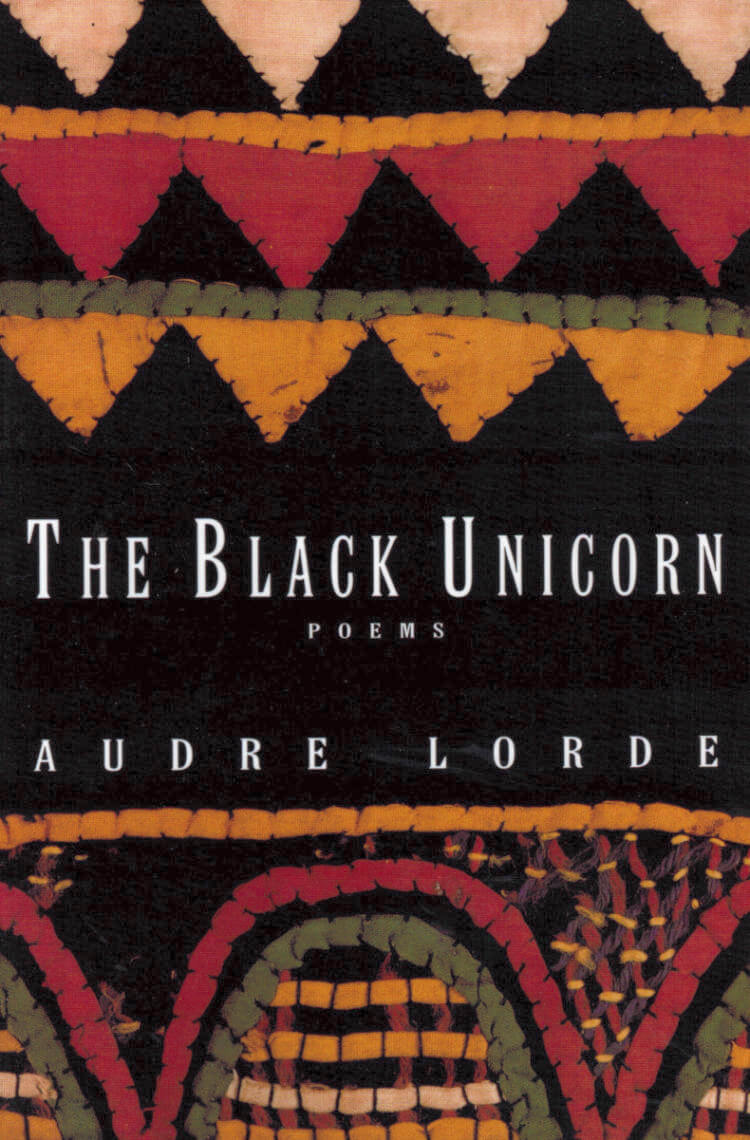
The Black Unicorn
The Black Unicorn is a collection of poems by a woman who, Adrienne Rich writes, "for the complexity of her vision, for her moral courage and the catalytic passion of her language, has already become, for many, an indispensable poet."
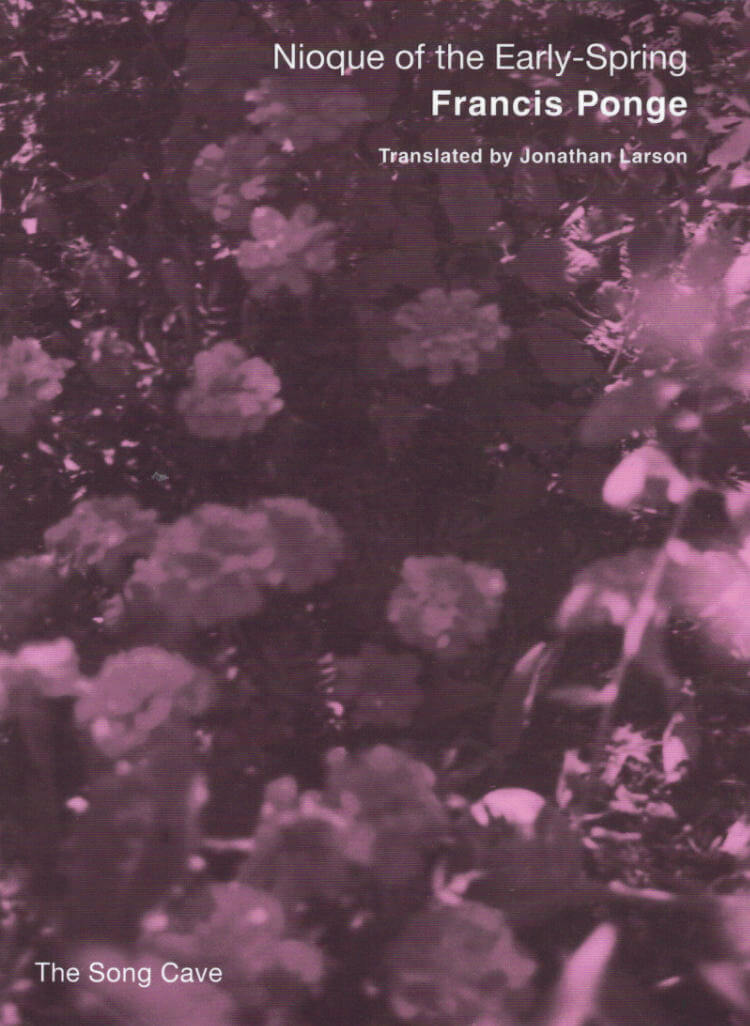
Nioque of the Early-Spring
Translated from the French by Jonathan Larson.
On the 50th anniversary of its publication, The Song Cave presents the first English translation of Francis Ponge's NIOQUE OF THE EARLY-SPRING. Ostensibly a book written to honor the season itself and the cycle of time, upon its first publication in Paris, May 1968, these notes took on a greater metaphorical meaning within this context, addressing the need for new beginnings and revolution.
April is not always the cruelest month. In these stray notations dated early April 1950, Ponge provides a latter-day version of Stravinsky's 'Sacre du printemps' or of William Carlos Williams' 'Spring and All', a vernal enactment of all the resurrectional energies of a spring-time-to-come, as witnessed firsthand at the farmhouse of 'La Fleurie' in southern France. When subsequently published in Tel Que in May 1968, eighteen years later, Ponge's rural, pastoral text now acquired a specific urban history and Utopianism, its Lucretian 'Nioque, ' or gnosis, now speaking to the gnomic revolutionary slogans of the Left Bank barricades: 'Be realistic, demand the impossible, ' 'Beneath the cobblestones, the beach.' Jonathan Larson's careful engagement with Ponge manages to seize what is most prosaic about his poetry—its fierce communism of the ordinary, its insistence that taking the part of things means taking words at their most etymological everydayness. - Richard Sieburth
This startlingly fresh and necessary document of the 1950s by Francis Ponge comes to us via the all too rare feat of true poetic reenactment. Understanding that each poet creates language anew, Jonathan Larson has found a poetics suitable for the occasion of Ponge's own poetic logic In this rendering, Larson's absolute care and attention to syllabic weight and measure, to the syntax and length of each line as it unwinds, allows us—as readers—to come into the drama of a text newly made, in other words, to discover a new poem in its very making. Yet, none of this comes at the cost of accuracy or through the subjugation of the original at the hands of one wielding the imperial language This is no mean feat in this day and age and, by way of Larson's exquisite ear, we are again given the poignancy and urgency of Ponge's own moment. - Ammiel Alcalay
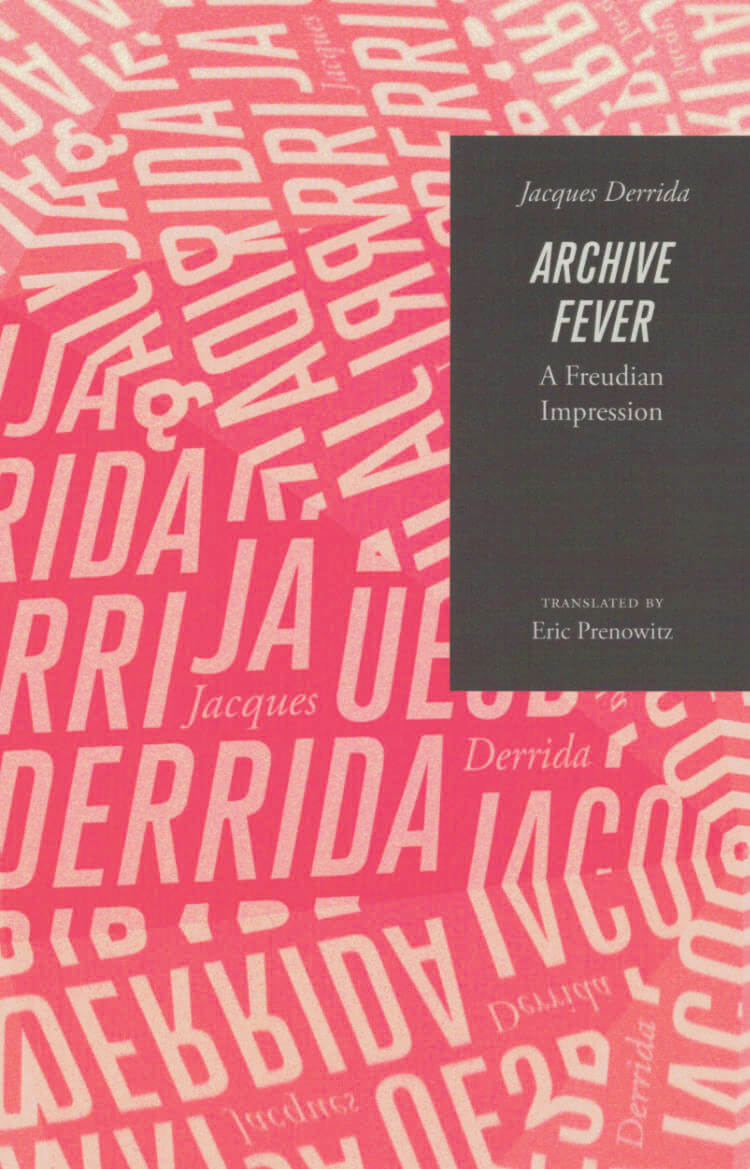
Archive Fever
In Archive Fever, Jacques Derrida deftly guides us through an extended meditation on remembrance, religion, time, and technology, fruitfully occasioned by a deconstructive analysis of the notion of archiving. Intrigued by the evocative relationship between technologies of inscription and psychic processes, Derrida offers for the first time a major statement on the pervasive impact of electronic media, particularly e-mail, which threaten to transform the entire public and private space of humanity. Plying this rich material with characteristic virtuosity, Derrida constructs a synergistic reading of archives and archiving, both provocative and compelling.

Without Alibi
This book brings together five essays by Jacques Derrida, which advance his reflections on many issues: lying, perjury, forgiveness, confession, the profession of faith, and, most recently, cruelty, sovereignty, and capital punishment.
Strongly linked by their attention to "performatives" and the "as if," the essays show the necessity of thinking beyond the category of acts that are possible for a subject. Derrida argues forcefully that thought must engage with the im-possible, that is, the order of the unforeseeable event, the absolute future still to come. This acute awareness of the limits of performative programs informs the essays throughout and attunes them closely to events of a world undergoing "globalization."
The first essay, "History of the Lie," reviews some classic and modern definitions of the lie (Augustine, Rousseau, Kant, Koyré, Arendt), while renewing questions about what is called lying, as distinguished from other forms of nontruth. This inventive analysis is followed by "Typewriter Ribbon," which examines at length the famous lie recounted by Rousseau in his Confessions, when he perjured himself by accusing another of his own crime.
Paul de Man's reading of this textual event is at the center of Derrida's patient, at times seriously funny analyses. " Le parjure, Perhaps" engages with a remarkable novel by Henri Thomas that fictionalizes the charge of perjury brought against Paul de Man in the 1950s. Derrida's extraordinary fineness as a reader and thinker of fiction here treats, to profound effect, the "fatal experience of perjury."
The two final essays, "The University Without Condition" and "Psychoanalysis Searches the States of Its Soul," address the institutions of the university and of psychoanalysis as sites from which to resist and deconstruct the nontruth or phantasm of sovereignty. For the university, the principle of truth remains at the core of its resistance; for psychoanalysis, there is the obligation to remain true to what may be, Derrida suggests, its specific insight: into psychic cruelty. Resistance to the sovereign cruelty of the death penalty is just one of the stakes indicated by the last essay, which is the text of a keynote address to the "States General of Psychoanalysis" held in Paris, July 2000.
Especially for this volume, Derrida has written "Provocation: Forewords," which reflects on the title Without Alibi while taking up questions about relations between deconstruction and America. This essay-foreword also responds to the event of this book, which Peggy Kamuf in her introduction presents as event of resistance.
Without Alibi joins two other books by Derrida that Kamuf has translated for Stanford University Press: Points . . .: Interviews, 1974-1994 (1994) and Resistances of Psychoanalysis (1998).
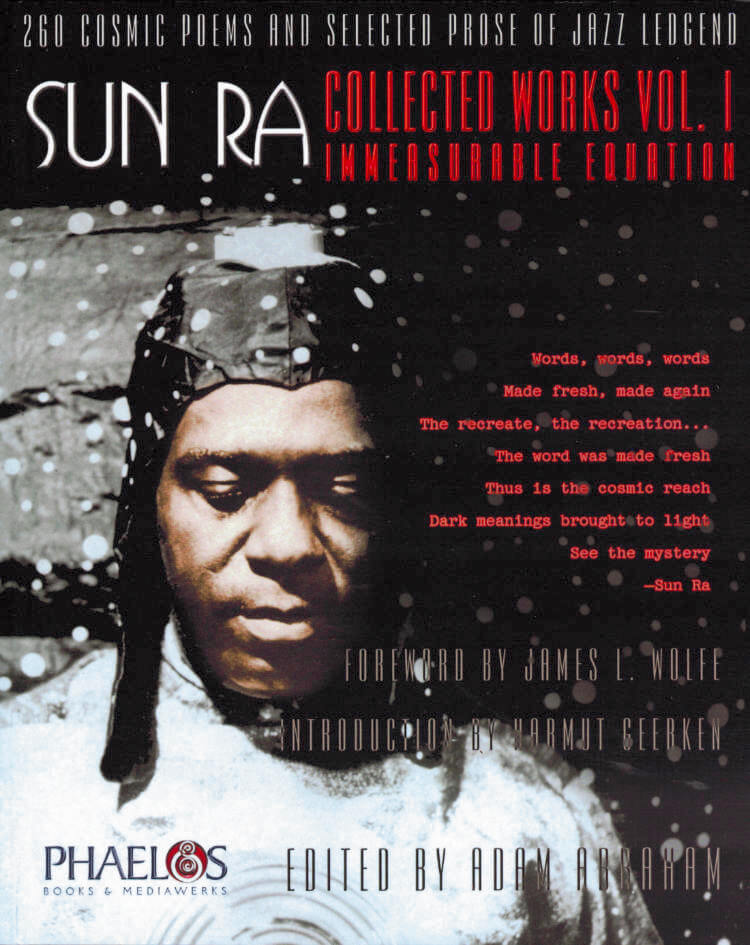
Immeasurable Equation
A stunning collection of 260 of Sun Ra's cosmic poems and selected prose.
Sun Ra's poetry leaves everything behind what's called contemporary, and flings out pictures of infinity into the outer space. These poems are for tomorrow.